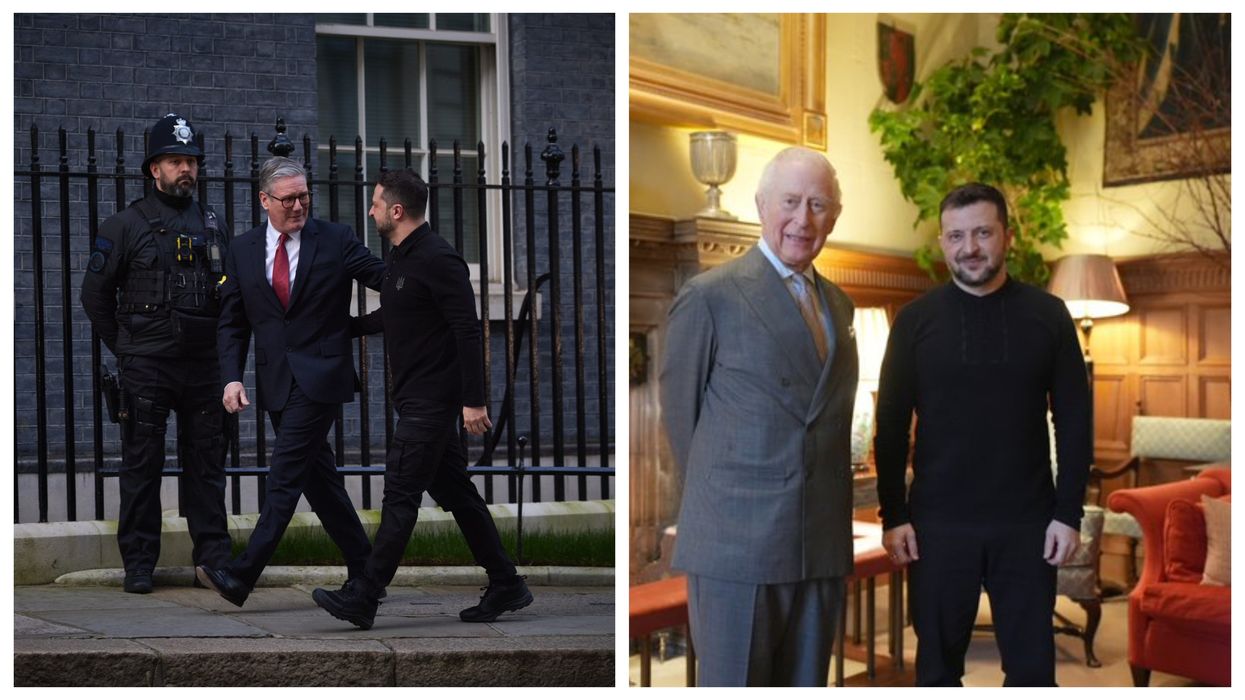UKRAINIAN president Volodymyr Zelensky met prime minister Keir Starmer and King Charles during his visit to Britain, as Ukraine secured new financial and military support from the UK.
Starmer welcomed Zelensky to Downing Street on Saturday, a day after the Ukrainian leader’s meeting with former US president Donald Trump. Zelensky also met King Charles at Sandringham House in east England on Sunday.
Zelensky was greeted by supporters outside Downing Street before being embraced by Starmer. "You're very, very welcome here in Downing Street," Starmer told him. "You have full backing across the United Kingdom, and we stand with you, with Ukraine, for as long as it may take.
My support for Ukraine is unwavering.
The UK stands with you, @ZelenskyyUa. pic.twitter.com/PsVKyRHKvx
— Keir Starmer (@Keir_Starmer) March 1, 2025
Zelensky thanked the UK for its continued support, saying, "I want to thank you, the people of the United Kingdom, for such big support from the very beginning of this war."
He also noted his upcoming meeting with King Charles, saying Ukraine values its strategic partnership with the UK.
King Charles hosted Zelensky at Sandringham on Sunday, where they spoke for nearly an hour.
Zelensky described the meeting as "very good," adding, "I'm very grateful for how His Majesty helps Ukraine and supports us."
He also acknowledged the Royal Family's backing, including visits to Ukrainian soldiers training in the UK.
My support for Ukraine is unwavering.
The UK stands with you, @ZelenskyyUa. pic.twitter.com/PsVKyRHKvx
— Keir Starmer (@Keir_Starmer) March 1, 2025
During the visit, the UK and Ukraine signed a £2.26 billion loan agreement to support Ukraine’s defence capabilities.
The deal, signed by chancellor Rachel Reeves and Ukrainian finance minister Sergii Marchenko, will be repaid using profits from immobilised Russian sovereign assets.
Starmer also announced a new £1.6 bn agreement allowing Ukraine to purchase 5,000 air-defence missiles using export finance.
The missiles, produced by Thales, have a range of over six kilometres and can be deployed from land, sea, and air.
“This will be vital for protecting critical infrastructure now and strengthening Ukraine in securing the peace when it comes,” Starmer said during a summit in London.
Meanwhile, the UK responded to reports of a proposed partial truce in Ukraine.
French president Emmanuel Macron told Le Figaro that the UK and France had suggested a one-month ceasefire covering air, sea, and energy infrastructure.
However, UK armed forces minister Luke Pollard told Times Radio that "no agreement has been made on what a truce looks like."
A day after European leaders rallied around Ukraine in London, French foreign minister Jean-Noël Barrot also warned that the Ukraine "front line keeps getting closer to us".
Zelensky said Monday he would work with Europe to set terms for a possible peace deal to present to the US, after allies gathered in London pledged to spend more on security and assemble a coalition to defend any truce in Ukraine.
The weekend crisis talks, which brought together 18 allies, came at a delicate moment for war-battered Ukraine, facing uncertain US support and on the back foot against Russia’s three-year invasion.
Days earlier, Trump had berated Zelensky in front of reporters at the White House, heightening fears he intends to force Kyiv into a peace deal that gives Russian president Vladimir Putin what he wants.
But European leaders closed ranks in support of Kyiv, with Zelensky saying afterwards the summit cemented their commitment to work towards peace.
"We need peace, not endless war," he said on Telegram.
"In the near future, all of us in Europe will shape our common positions—the lines we must achieve and the lines we cannot compromise on," he added. "These positions will be presented to our partners in the United States."
Starmer said that Britain, France "and others" would work with Ukraine on a plan to stop the fighting, which they would then put to Washington.
A UK government official added that discussions were ongoing with the US and European allies, but a one-month truce had not been agreed upon.
The talks came as Ukraine continued to face Russian attacks.
Last week, Russia launched over 200 drones in an overnight assault, which Ukraine described as the largest such attack since the war began.
(With inputs from agencies)





